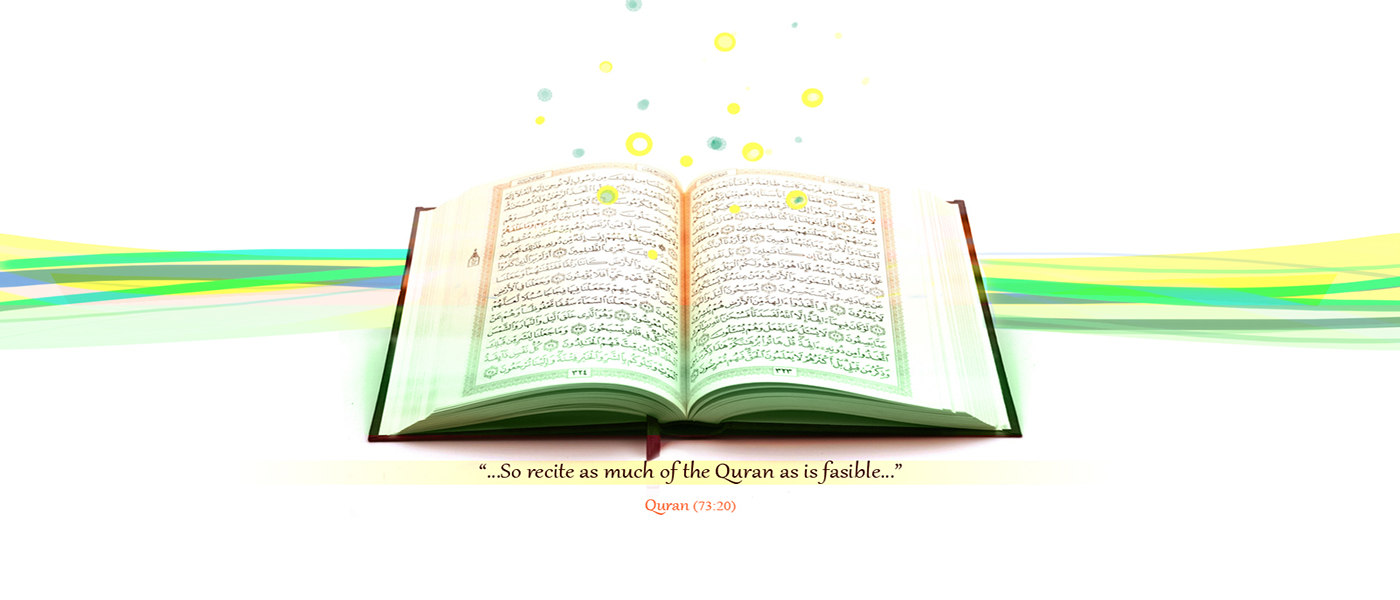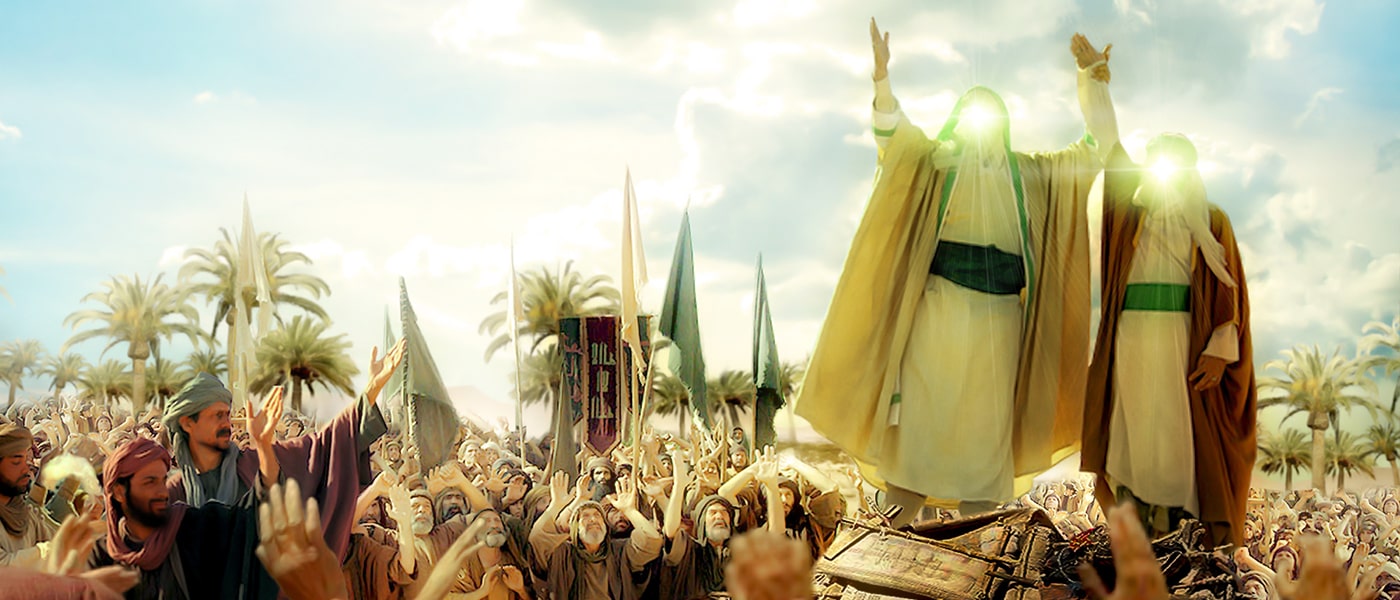

6 Facts That Prove the Quran to Be Allah's Words
Allah Almighty is the all-knowing all-wise creator. He has considered a unique way of perfection for every creature and then guided it to reach its excellence (20:50). Human beings, as autonomous creatures, are in real need of divine guidance to know how to live a perfect and purposeful life. According to Islamic beliefs, the Quran is the divine revelation to Prophet Muhammad PBUH&HP that contains necessary guidelines for human beings: "As We sent to you an Apostle from among yourselves, who recites to you Our signs, and purifies you, and teaches you the Book and wisdom, and teaches you what you did not know." (2:151). The question is that, is the Quran Allah's words? Let's see why the answer is: Yes.
1. The Holy Quran and the Prophetic Narrations are Not of the Same Style
If the Quran was Prophet Muhammad's PBUH&HP words, his PBUH&HP narrations should have been of the same eloquence and beauty of the Quran. But that's not the case. The Quran is unique in style, expression system, and arrangement. And that's why no one has been able to bring even a chapter (Surah) similar to that of the Quran. As the Quran says: "And if you are in doubt concerning what We have sent down to Our servant, then bring a Surah like it, and invoke your helpers besides Allah, should you be truthful." (2:23). Although the prophetic narrations are articulate and eloquent, some of them have been imitated and distorted, unlike the Quran [1].
2. Prophet Muhammad PBUH&HP Never Claimed These Words to Be His
If the Quran were Prophet Muhammad's PBUH & HP words, it would have been logical for him to claim that these eloquent words were his. Consequently, he could have promoted his position, fascinated his opposers, and gathered more followers. But, he never intended to be considered and praised as a superior power. On the contrary, in one instance, someone came to him and was uneasy because of his magnificence and grandeur, he said: "Calm down! I am not a king" [2].
3. The Objection of Prophet Muhammad's PBUH&HP Oppposers Were not Answered Immediately
In some of the Quranic verses, the objections and disagreements of Prophet's PBUH&HP opposers are answered. If the Quran was Prophet Muhammad's PBUH&HP words, all these verses should have been quickly revealed right after an objection was raised, or when he was insulted or oppressed. But, this was not always the case [1].
For example, the Qiblah at the time of Prophet Muhammad PBUH&HP was originally the Noble Sanctuary (Al-Aqsa Compound), similar to Judaism. That was a reason for Jews to mock Muslims and say that Muslims follow them; hence, they are superior. Prophet PBUH&HP waited 16 months for the divine revelation to let him change the Qiblah while he was disturbed by Jew's words. It was after such a long delay that he received a response: "turn your face towards the Holy Mosque, and wherever you may be, turn your faces towards it!" (2:144). If the Quran was Prophet Muhammad's PBUH&HP words, he could have changed the Qiblah much sooner and suffer less.
4. Some Verses of the Quran Warn Prophet Muhammad PBUH&HP
In some of the verses of the Quran, Prophet Muhammad PBUH&HP is warned. In Surah Tawbah, he is told that: "May Allah excuse you! Why did you grant them to leave [to stay behind] before those who told the truth were evident to you, and you had ascertained the liars?" (9:43), or in another Ayat: "A prophet may not take captives until he has thoroughly decimated [the enemy] in the land." (8:67). Is it logical at all that someone blames himself and makes it public?
5. Prophet Muhammad PBUH & HP Was not Able to Read and Write
Prophet Muhammad PBUH&HP was not literate, and this is stated in the Quran and historical records. "You did not use to recite any scripture before it, nor did you write it with your right hand, for then the impugners would have been skeptical." (29:48). So, how can someone illiterate bring such eloquent words?
6. There is no Contradiction in the Quran
This holy book was revealed for 23 years. And something astonishing about the Quran is that there is no contradiction among the verses of it. If it was a human's words, there surely existed contradictions and errors in the Quran because human beings are forgetful, and for example, they forget what they told two years ago. But, this is not true about the Quran.
References:
- Allah's words
- M. H. Hakimi, et al. "Al-Hayat," vol. 2, Translation: A. Aram, Iran, 1986.
Share This Article

Leadership
One of the principles of Muslims (Shia Islam) is Imamate which means leadership and is a universal authority over people’s religious and worldly affairs. Imams are religious experts who are consciously and willingly infallible and perfect leaders who provide believers with Islamic teachings and laws to help them reach prosperity and perfection.
The Difference between Imams and Prophets
The followings are the differences between Imams and prophets:
The prophets have brought us the religion, its axioms, and God’s commandments using revelation they received from God, whereas Imams protect the religion against any kind of deviation or distortion and are responsible for the performance of God’s commandments.
In other words, prophets show us the right way towards the divine source, i.e., God, but Imams guide us through this path step by step until we reach it. Apart from the necessity that the Prophet’s path should be known, there have to be leaders (Imams) who are perfect themselves and can teach people and stimulate their energy to help them realize their full potential at any time.
The second difference is that prophets had direct communication with God, and God’s commands were revealed to them, but Imams have not been direct receivers of God’s message; rather, they got it from prophets, and at times, they were supposed to interpret and update that message.
However, whatever roles the prophets had, have been all transferred to Imams. Moreover, our major prophets were Imams, too; they were also responsible for the protection of God’s religion as well as performing His orders in the society and had significant roles in guiding people.
The Status of Leadreship
As mentioned above, not every prophet was Imam, nor did every one of them have the opportunity to expand and interpret the commandments they received from God. There are two important examples of the greatest prophets that were also Imams; Prophet Muhammad (PBUH) and Prophet Abraham.
What the Quran says about Abraham is that he was tried by God with certain commandments which he fulfilled (2:124). His final test was to slay his son - Ishmael- who was born to him when he had reached his old age. After they both submitted to the command of God and Abraham showed his willingness to sacrifice all his belongings for Him, God asked him to stop, for He wanted to see his sheer submission, not sacrificing his son. So Abraham had passed the stages of prophethood and a lot of exams when he reached the status of Imamate and God appointed him as the leader of humanity:
“[Allah] said, I am making you the Imam of mankind ” (2:124).
This dignity was also given to our last prophet -Muhammad (PBUH) - who conveyed the message of God at the beginning of his mission and in the meantime he carried on teaching people and leading them to the right path.
The Necessity of Leadership
In the religion of Islam, Imamate is a position that is necessary according to the following rationales:
The Grace of God
According to Shia viewpoints, Imamate is proved to be the grace of God (Lutf), which is one of His attributes defined as ‘beneficence’ or ‘kindness’ that would help to bring His creatures nearer to His obedience and facilitate their moral rectitude. In fact, that is the grace of God that requires Him to appoint Imams to keep people away from God’s disobedience.
Protection of the Religion against Distortion
Training Talented Human Souls
People are different in obtaining awareness; some are capable of finding the right path, some are not; Imams help both groups to find their way through perfection.
Continuity of the Religion
23 years of preaching did not give Prophet Muhammad (PBUH) the opportunity to teach people Islamic laws, thoughts, and beliefs completely. So, there had to be perfect people, trained by the prophet to give humans all the Islamic teachings and to guarantee the endurance of religion.
Being Living Role Models for People to Follow
Strengthening the Rational Laws
Prophets are necessary to strengthen the rational knowledge of humans by their words. Although people can rationally understand the majority of realities about religious principles, there are still uncertainties in their hearts which can prevent them from carrying out such principles wholeheartedly.
However, when these rational perceptions are strengthened by prophetic words then all of these doubts and distrusts would be obliterated, and humans can approach their sacred goals. There are some affairs whereby the common sense of human beings cannot identify their advantages and disadvantages.
In such cases, people should resort to religious leaders to help them distinguish the good from what is not. Many things can be useful, and some others can be harmful. Before ascertaining which is which, human beings are not able to distinguish between the good and the bad purely by relying on their intellectual power. Consequently, they feel the need for someone who can clarify these qualities, and this is something which is only within the power of religious leaders who are connected to the divine through revelation [1].
Divine Wisdom
God has a purpose for his actions, and since He is absolute perfection, the ultimate purpose of His divine action is creating the human being, and the aim of human creation is his perfection, the best example of whom are Imams. Furthermore, the human is the noblest of all creatures and Imams are the noblest of them who reach perfection before anyone else on earth. In other words, life, existence, knowledge, power, and beauty cannot be given to or obtained by the other creatures before they are manifested in perfect beings, Imams.
Leadership in the Quran
The importance of Imamate is clearly stated in this verse of the Quran:
“Today I have perfected your religion for you, and I have completed My blessing upon you, and I have approved Islam as your religion” (5:3).
Complete vs. Perfect
According to this verse, Imamate is what through which God has perfected His religion and completed His favor. Here we need to see the difference between perfect and complete:
The religion is considered complete only if it includes all the necessary constituent parts. Perfect versus incomplete, however, has a different meaning. A complete compound object can potentially turn to something it is capable of; that is one can change and pass through the stages of perfection until they reach it and as long as they have not attained that very last stage, they are still incomplete.
The Completion of the Religion
The religion of Islam gets completed when God’s commandments (favors) like praying (Salat), fasting (Sawm), Zakat, Khums, etc. are all sent to us. Imamate completes the religion, for it is the last favor sent to human.
The Perfection of the Religion
The perfection of Islam, though, concerns the truth of this religion, not the exoteric laws and commands. One cannot fully understand the reality of Islamic doctrines, i.e., monotheism (Tawhid), prophethood (Nubuwwah), the afterlife (Ma’ad), alone without Imams. Therefore, Imamate, the last stage of human evolution, improves the quality of faith without which the religion cannot reach its perfection.
Who are Imams?
As mentioned before, Imamate is the last grace of God upon us which has to exist so as to prove God’s perfection. This cannot be endowed unless Imams are infallible and therefore this status of them needs to be text-oriented; that is their selection by God is stated in Quran and Hadith and asserted by Prophet Muhammad (PBUH) and each of his twelve successors:
- 'Ali ibn Abi Talib;
- Hasan ibn 'Ali;
- Husayn ibn 'Ali;
- 'Ali ibn Husayn;
- Muhammad ibn 'Ali;
- Ja'far ibn Muhammad;
- Musa ibn Ja'far;
- 'Ali ibn Musa;
- Muhammad ibn 'Ali;
- 'Ali ibn Muhammad;
- Hasan ibn 'Ali; and
- al-Mahdi.
God has never left the earth devoid of an Imam; Imam Mahdi is our current Imam and the ultimate savior of humankind who has been living in occultation since 874 AD and will return with Christ to fill the earth with peace and justice.
Conclusion
So the concept of Imamate, rooted in the revelation of God, is approved in important verses of the Quran, and what’s more, it is rationally based on the reasons mentioned above. God has created humans to give them the opportunity to go through the right path to attain eternal bliss and perfection. That is why He has appointed for us infallible Imams as successors of the last prophet -Muhammad (PBUH) - to help us achieve this purpose.
References:
Read More

7 Essential Questions Answered about the Holy Quran
The Holy Quran is a record of the exact words of the last revelations from Allah Almighty to Prophet Muhammad (PBUH&HP). Since he was uninstructed (29:48), he recited the words to his companions, who either memorized them or wrote them down. Here are some facts about this divine Book.
1. How Was the Holy Quran Revealed?
The Holy Quran was revealed to Prophet Muhammad (PBUH&HP) through the archangel Gabriel (Jibrail) in two forms [1]: all at once and gradually. The Holy Quran was once revealed on the night of Qadr (Laylat al Qadr): “The month of Ramaḍan is one in which the Quran was sent down” (2:185). Also, it was sent incrementally over 23 years until he passed away, which caused the faithless to object: “Why has not the Quran been sent down to him all at once?” (25:32)
2. Who Turned the Holy Quran into its Written Form?
During the life of Prophet Muhammad (PBUH&HP), the Quran was written on the skin of animals, palm’s wood, and tissue. After Prophet Muhammad (PBUH&HP) demise, there was a need to unify the written texts of the Quran into one specific Arabic dialect and to clarify the reading of the Quran. This happened in the time of the third Caliph, who ordered to collect a unique version of the diacritic the Quran, and other versions were eliminated such that he united the Muslims on one authoritative recension [2]. It should be noted that the actual version of the Quran is the one which was originally collected during the time of the Prophet Muhammad (PBUH&HP) and under his supervision. That is to say, the content of this holy book has remained undistorted since it was first revealed to Prophet Muhammad (PBUH&HP), and only its form and diacritic was unified at the time of the third Caliph. Therefore, the longer surahs are found at the beginning of the Quran and the shorter ones towards the end.
3. What Are the Other Names of the Holy Quran?
The Quran has some other names the most important of which are [3]:
• Al-Kitab, meaning the Book: “This is the Book. There is no doubt about it.” (2:1-2);
• Al-Furqan, meaning the criterion for the right and wrong since it gives Muslims some tools to differentiate between the truth and false, the lawful and unlawful: “Blessed is He who sent down the Criterion (the Furqan) to His servant that he may be a warner to all the nations.” (25:1);
• Al-Dhikr, meaning a reminder because the Quran reminds us of Allah Almighty: “Indeed We have sent down the Reminder, and indeed We will preserve it.” (15:9).
4. What Are the Number of Ayats and Surahs of the Holy Quran?
The Quran is composed of 114 chapters, called "Surahs", and 6236 verses, called "Ayats". It is divided into 30 sections called “Joz’” and 60 sub-sections called “Hizb.” The longest surah is Baqarah and the shortest Kawthar.
5. What Are Different Kinds of Surahs in the Holy Quran?
The surahs of the Holy Quran are divided into two groups: those revealed to Prophet Muhammad (PBUH&HP) when he lived in Mecca, called Makki, and those from after his migration to Medina, called Madani. Generally, the ayats about the Islamic axioms, such as monotheism, prophethood, and afterlife, were revealed in Mecca since the new Muslims required to get fully acquainted with these principles. The ayats about governing the Islamic society, practical principals, and details were revealed in Medina.
6. How Are the Surahs Named?
Every surat of the Quran has a specific title. These titles were known from the time of the Prophet Muhammad (PBUH&HP), and he was the one who introduced these titles initially. The titles were determined to represent the concept and topics discussed in that surat or a priority considered in the Quran about that surat [4].
7. Why and How Should We Respect the Holy Quran?
It is essential to treat the Quran respectfully since it is a divine revelation in every aspect. In this regard, the paper upon which the Quran is written and the Arabic words on its pages should not be touched without having performed ablutions (Wudhu). Moreover, when one is reading the Quran out loud, it is better if the listener keeps silent, listens (7:204), and thinks about the meaning of words.
References:
- M. H. Ma’rifat, “Introduction to the Sciences of the Qur'an,” p. 64, 2000, Tamhid Qom cultural institute, Qom, Iran.
- M. H. Ma’rifat, “Introduction to the Sciences of the Qur'an,” p. 133-136, 2000, Tamhid Qom cultural institute, Qom, Iran.
- Islamiccenter.org/other-names-of-the-quran/
- Hawzah.net/fa/Article/View/97389
Read More

